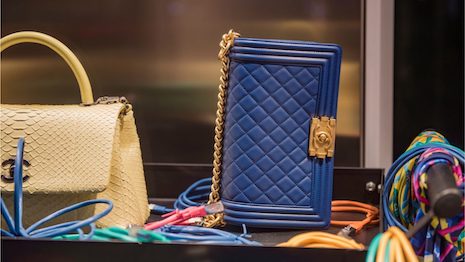U.S. global asset management firm AllianceBernstein is adjusting its global luxury goods sales outlook.
Analysts are now reportedly anticipating a 2 percent contraction to hit in 2025, versus previous estimates which reflected a 5 percent jump in market value. This revision follows the recent implementation of U.S. tariffs affecting key luxury-producing regions, including the European Union, Japan, Vietnam and Cambodia.
Market response
The newly imposed tariffs, ranging from 10 to 50 percent, are expected to increase costs for luxury brands (see story).
This development may lead to higher retail prices in the U.S., potentially dampening consumer demand, with ripple effects to be felt worldwide. Specific regions such as Switzerland, which faces a 31 percent U.S. import tariff, are battling higher taxes than others.
 The luxury goods market, notably high-margin items like bags and shoes, is said to still be recovering from the sales impacts of COVID-19. Image credit: Shutterstock
The luxury goods market, notably high-margin items like bags and shoes, is said to still be recovering from the sales impacts of COVID-19. Image credit: Shutterstock
From LVMH to Swatch Group, down 4.2 and 3.6 percent respectively as markets closed on Monday, European luxury stocks have reacted negatively to the tariff announcements, mirroring growing investor concern over the potential impact on earnings within the sector.
Experts within AllianceBernstein’s research division advise investors to assess companies' geographic and product exposure to tariffs.
Luxury has largely remained silent on the matter, while a rare few brands, including Italian automaker Ferrari (see story), have gone public with pricing plans.
{"ct":"DuG1dOB3HOpD6vK8VPUwv7l2PFtzzO6Txb1fp7ZEopRNUFSwef5CeXZ5\/vkp6scM\/huHY6QvwtXn9rGdHAOMqguQBjvXFyrvLGCXEN2MxY81pHLRjMRBvlI\/kBFNgICxu7GzUXqsdl0jY2EOL2pEYpXojN7EarR87q8827MTSz7ctZhN1V65wdzFY8mpROUaVzll1VFIR6PW87FvYV2Z6izBORDmpzpEkaV9DpT0ui\/z9qAmt4OXILZdzIGb\/KzTYSw4iZQctBOqR5ju8vHlh+CRO5OFjhvKpSv+cP3ylYwqmamxAvpYXnLVm1DKvYNymuue8Mh4rCNuwwmMqbJgqykPcWG6cF\/xdjIyTGeCkXg6iXX4nRchLggiLfowIgFW3rJYURqdKjcMn\/86K0CYGzoKE1Gs4BxrXzJefofk7ie9MYYuYVS55E881G0uHbrwtmHqeXNOqu3\/A\/9OTQVQ3X4O9Mco0xXtW7UdLZxLlQXUHkpN2\/waC1WQPUQGk+bSBHfWLq2LYTIyp5M9cBn5nhAFTq2K3+xxyha\/6R1TqJhssBt\/xTDiK2Spr1e7t+FbDy6mSqJdGLwiPd34Rgv9E2E3462NsCtJ5HkA1kJXSYklMQFlo6BHQMfLC0Os3QMUUAc08ME3M+7MUDIobyAOM4q4nozPsBIveWsLmRNU3N82SunIwb07EHxvpJztNpY4sCTV1Zvcr8mk6HwGyQxY\/S9\/zb33yuuOSylZl\/1xgoUmCeeh8AFVZrsWJ3QdLVvIC2GWerHJOCvgNb9eG9gKh43uk131\/FrA6it\/5nGDwF624LuOSiq6c4sXJf+pOUcaQb\/H1P3HzUKyKpezoy6BKwjs+RCeQ5YpqVnbzT6YHUYRv+w\/6EatuaPUQ3Fgma9X1H9PNyoD6wlU9kyTeo\/suoXEOuTkwEOBkBJ7usYC315zl4moWiyZHct\/YxvN5vkKUjfR9lp6\/m9ge0AkHjCn77JkkVhT2tJBN1hJo15U1C2EaA6o+68s\/Oz6HSMlsGvUN4VBPRg7lO7Pqphh8ppG4GkiXxCGZiVQI\/\/fx\/xxzk\/pMJzlDz87xYG4O5leihtehJznJY1PXA0qUeMVbLdjpAlU5PZrnb+4r5Zd9U04wILIl3ost13Q7qFE2Q5WNzlGVK452btf4bf9KElKfyRNinHYs4Lo5IYOJ66evub1d9PGHk800ZPsK5E\/Qbassva3pmjT0MAU490nojV\/t2ogEypJIU5vtPHFyp2K2zJFGDl+RPBja4vXSbf1K+xWg0JzcfSQZH4Z\/Va8qICH9XhKTuuAPWT7vnZ4ZgD9ENevBNbY\/MSFvBAHdvh6DoQSiXoU4zcfXW8rTL73Dly8PuiNKR0DVZ2k\/vfTd0IeN8pN0s9guUKvdBdepfcQe6Egh\/miO8\/Ji7qEJBiBlbFFNPQr6Y8hs+NsB9EVL0gdyMVbrAJSyvakgMmYCKIL1WIw8YE4kdrv5O5D1EanEsSQEZBDwqFkY9XmySpzstE1gVd2nE8KiTPO09rxdOSd+PxS6PMrBLKpU37e1iSh7kvj8r6wMcObewve9GCQO1gjQINBa8mhour+o795\/3l1YqbA+PCmhaUNLWHzjfM6cTiRkJLiScF\/LXQtmhi6Edqnw\/lRahUu3op9aWIHXxVsoRr6WU2SMj2Gf5A2gfeCmhFhWOkPcFoH3iq+VmbF2fRByrjFEzm425fP8YFU\/Oy4o+y1moWNaQCNgEVVhdBx66Oy1MaByaX9ox+6UF9KnMeNdmo38z2LQNGIosTilLz6+JsmS174tGrpjTogPXayPsMPGIkmzO1n\/xxKzOFap5FwrVQUGSLaTWy1Tz8I+ADfIj69wto3vhncehildHEq5Vix7aXmg7\/0jIW\/ybVFi5FyV9gK9nb9mB6wypTbw1zRap0+pANfHapqF492HkFDfLsa2\/O+S+CU++oldDO7+H2M99QvhyC13TFkmmyBUbB6ifP1cF0LWM7fH8s731aIk4jHzL1OnJd0qY338ZZyLjhQ5O+BIGXlkwYzHdO\/QYhPdRj7rK2b2ZVQy4eisl2iOXUrX\/XYA4fzs0wYjMTRxcTLsG89Tgc384qRJ+leLA+K7Ae5Sddt1OVi9K+uBZ9sn0qM4wY1k5SM4yXptMr80chZ3VGFIKuImbmLJShDlQrLIbsOMhumyoPYs2EJXBE0AEOivmgMj5XLi8Ix4HhVVZ3jx\/RdXFTGDA+5rEovrV8moSZtSnQoscPDzeHr+78jNYQxJicxQI\/Ff1j2ZnfN\/xUwbGz8wfoBhdEHa3Sl4pr0UgM+dPFi\/UQMKicnfrligCWTA5oiA6G0nLak7mNbjT8E6bXZgSCiCU8Lgxu6RAaapaVjfaa4YOb4KBZXOaTEi1NJklkMb3SztlLGmdr0qdrNwp77kXV6zCindX\/GkZuKlZATnKsrjKx1+lIkWu6EiKhi225YJ6miIwn9yXoGQ2TNYxsYi9hZHKp\/aKF2e4xPbFnrQ1mrJolTYi0B1iJ8PttTkgqpHVVJuWcTZIWf58qKZ+nlLdJ6Zr7mXv1A2\/N3v+ootyp\/hRYwe9O2b07ktbmf9H\/yiv84vhdHETW+jZMmF\/sbsoPRMaXutiPuX4GPJ5Rt\/+lU9dGAbFzhUZKyRDskG5n0USorfx\/OqeetWpCuBPX9DwWt6TswKTuW\/US0lAGkXiFH6V4XuWmHkJtEj5OZnmoWJIBMeLVx4BqxTgFMs2L7AmuF2dr4UHVIg7Je6SvNq\/q5y22Ddm1JUIx7JYC\/GoYYtsosDqVBndPOGpveVDjNzsrdHDWvgFyH5XFOG7m+55XGs2gTkPhcoXwgBbTzHzHhrcBV8cKuF+\/C\/Xgw\/+0JngO6feJa+t929BaUUbd8JfIS82WrNszKj9K\/bZ2f9pfZgsTpvy01rDkCgNmOrsYIDzbnbY6\/1iCB5gPxLPERsK489nROtpExenqW8978byZ5iTzQmU+VlsrSXetnjVoHAJfeEMIRb7off2dbcAgP54jR6Xc0lCBzXZim8fj0Wk7bvad0G0jmLfmMoGFFROVh+3WdEIt6mZWW\/sGzOaAu3EaLkfIboGHxvn+OqM27DQySZgsHsCl\/hGln\/P486w9wiXaRBdlZuTiRaqx0QyIaFN0FO+aO2XYHah6Wp0R8Ky6\/03w+LYMevpuawwpULLTAEoLeVWNNgpN8kak3aD28hffMuue8JBIRLsXthP7Y8qTomTFu8pBmlf3ilVx6W2SB5NbewqnB4e9DS\/xgzFAuEEo6nmq0kg5G8HJPpRJbT18XbuW6Xo7JeLxb8dsYMyDUhPdJDUNTosbcKjNHk04N4WzICNimvFPraVFrdO6THeyBvv0Uvu2CSPvSwhPQO+DpIVFtJRoIcc1eJb\/V92cpb6sA\/Q4X5\/U1NX71YyuPnJmi4\/m41RYRvzFkxWMkK\/QJWQ7+a8OVcZIpPSnIaqlea4j6jFH\/qKRMEM0b5aOrU7YbFfdRwEeP7yMgfsYeZ20m11ok3aDdqjJVlEnIoEjkALFcPdUfC0hE0zqJTf5Of8ghEq1QiGUkq8\/b648CQeYnnD7srbtD1vfuJoegD4GXMn3o0TdpLYqV7zWDnXjMQWU4Bdv93pGcSBmmQfoub2e8fFB6cslvFtjjHW7y4V5Qmb\/IycC9UgLWswO9AdxcCYUt7eVZQu96ZARSxthxAkrGBNqCFK3bYBhY2+kXh9w6RX+gBV\/7tT0Efs0bcQFbgjx5Nf0M59nGnkladof+5sD6yBH4mpMYgMNJd8fOmLrgRYBi2TLWrE\/5a7dHhvrzKJ7InYN+A2dsrUDi6CkHaXmiajHDOmpYHGL2ZIbg0aa\/JmVSn28knPJMkH1RRv+Ab+5bMA==","iv":"59bbc6b47327cc719cbf72ea0666067f","s":"23671fcb76dd9467"}

 Luca Solca, senior research analyst of global luxury goods at Bernstein speaks at the Altagamma-hosted event. Image credit: The Altagamma Foundation
Luca Solca, senior research analyst of global luxury goods at Bernstein speaks at the Altagamma-hosted event. Image credit: The Altagamma Foundation  The luxury goods market, notably high-margin items like bags and shoes, is said to still be recovering from the sales impacts of COVID-19. Image credit: Shutterstock
The luxury goods market, notably high-margin items like bags and shoes, is said to still be recovering from the sales impacts of COVID-19. Image credit: Shutterstock